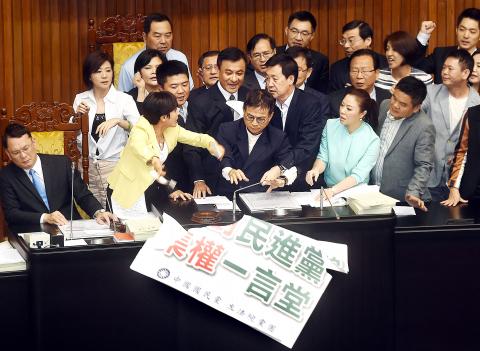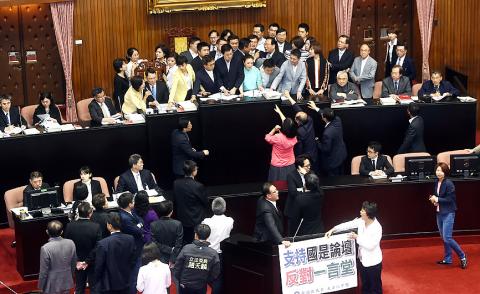The Chinese Nationalist Party (KMT) caucus yesterday occupied the legislative speaker’s podium for the first time in history, as the opposition protested the Democratic Progressive Party (DPP) caucus’ putting a motion to vote without conducting cross-caucus negotiations.
Lawmakers argued with each other, with the legislature descending into disorder over a motion to require the Executive Yuan and the Ministry of Education to retract social studies and Chinese-language high-school curriculum guidelines that were controversially announced in February 2014.
The motion — launched by DPP Legislator Cheng Li-chun (鄭麗君) — asked the legislature to decide whether to retract the guidelines promulgated by the ministry in 2014, which it said came about “through a process that breached the principles of transparency, professionalism and bottom-up social participation, and with adjusted content that defied facts and whitewashed the era of authoritarian rule.”

Photo: Fang Pin-chao, Taipei Times
The motion was removed from the agenda last month, pending a cross-caucus negotiation and as the one-month negotiation period ended yesterday, the motion was put to a floor discussion to be followed by a vote.
KMT Legislator Alicia Wang (王育敏) said in the discussion that cross-caucus negotiations were never convened and called for an amendment to the discussion agenda and cross-caucus talks over the motion.
KMT Legislator Ko Chih-en (柯志恩) said the motion, if passed, “has the risk of allowing the legislative branch to intervene in executive authority.”

Photo: Fang Pin-chao, Taipei Times
Cheng said that the motion is “the response made by the new legislature to new public opinion and a response to students’ rights advocate Dai Lin (林冠華),” who was a member of the Northern Taiwan Anti-Curriculum Changes Alliance before he committed suicide in July last year as students staged a weeks-long sit-in in front of the ministry building in Taipei to protest guideline changes.
“We have the right to reject brainwashing curriculum guidelines made in a ‘black box.’ What democratic society could approve of curriculum guidelines drawn up by ‘ooo’ and ‘xxx’?” asked Cheng, an apparent reference to the non-release of the names of those who participated in writing the guidelines.
KMT caucus whip Lin Te-fu (林德福) said a cross-caucus resolution reached in the previous legislature had already called for a re-examination of the guideline-adjustment procedure and permitted schools to freely choose which guidelines they would use.
“If the new public opinion wants to overthrow the negotiated resolution, cross-caucus talks must be convened,” Lin Te-fu said.
Legislative Speaker Su Jia-chyuan (蘇嘉全) put the motion to a floor vote after the discussion ended, prompting KMT lawmakers to walk to the front of the chamber, with Lin Te-fu thumping a lectern and shouting for “procedural justice.”
The motion passed amid the noise, with some of the KMT lawmakers failing to vote as they were busy protesting.
After the vote, Su moved on to process the next bill, while the KMT lawmakers chanted, calling for a cross-caucus negotiation and shouting: “Anti-black-box” and “Impartiality of the legislative speaker.”
With no halt to proceedings as they protested, the KMT lawmakers walked to the speaker’s seat and snatched away the microphone, holding a placard that read: “The DPP restricts freedom of speech.”
DPP Legislator Chiu Yi-ying (邱議瑩) also approached the podium and asked the KMT to “learn to be in opposition and be humble” before tearing the placard and throwing it to the ground.
Some DPP lawmakers said: “Stay where you are and don’t just leave in an hour; you have to learn how to occupy the podium for at least three days as we have done.”
The KMT lawmakers ended the occupation after about one hour, at which time Su announced, after a negotiation between the two main caucuses, that no motions would be discussed if requisite cross-caucus negotiations are not convened.
Su announced a recess to the floor meeting, which is to be continued on Tuesday.
However, not everyone was happy with the decision.
“Who made the decision to call off the meeting?” New Power Party (NPP) Legislator Huang Kuo-chang (黃國昌) asked. “Did you film the negotiation?”
In other developments, the legislature passed a motion proposed by the NPP asking that the government halt a review of Want Want China Times Group’s (旺旺中時集團) application to acquire the nation’s largest cable TV service provider, China Network Systems Co (中嘉網路).
The motion passed 75-0 with the DPP and NPP supporting it, while KMT lawmakers did not cast their votes.

AGING: As of last month, people aged 65 or older accounted for 20.06 percent of the total population and the number of couples who got married fell by 18,685 from 2024 Taiwan has surpassed South Korea as the country least willing to have children, with an annual crude birthrate of 4.62 per 1,000 people, Ministry of the Interior data showed yesterday. The nation was previously ranked the second-lowest country in terms of total fertility rate, or the average number of children a woman has in her lifetime. However, South Korea’s fertility rate began to recover from 2023, with total fertility rate rising from 0.72 and estimated to reach 0.82 to 0.85 by last year, and the crude birthrate projected at 6.7 per 1,000 people. Japan’s crude birthrate was projected to fall below six,

US President Donald Trump in an interview with the New York Times published on Thursday said that “it’s up to” Chinese President Xi Jinping (習近平) what China does on Taiwan, but that he would be “very unhappy” with a change in the “status quo.” “He [Xi] considers it to be a part of China, and that’s up to him what he’s going to be doing, but I’ve expressed to him that I would be very unhappy if he did that, and I don’t think he’ll do that. I hope he doesn’t do that,” Trump said. Trump made the comments in the context

SELF-DEFENSE: Tokyo has accelerated its spending goal and its defense minister said the nation needs to discuss whether it should develop nuclear-powered submarines China is ramping up objections to what it sees as Japan’s desire to acquire nuclear weapons, despite Tokyo’s longstanding renunciation of such arms, deepening another fissure in the two neighbors’ increasingly tense ties. In what appears to be a concerted effort, China’s foreign and defense ministries issued statements on Thursday condemning alleged remilitarism efforts by Tokyo. The remarks came as two of the country’s top think tanks jointly issued a 29-page report framing actions by “right-wing forces” in Japan as posing a “serious threat” to world peace. While that report did not define “right-wing forces,” the Chinese Ministry of Foreign Affairs was

PREPAREDNESS: Given the difficulty of importing ammunition during wartime, the Ministry of National Defense said it would prioritize ‘coproduction’ partnerships A newly formed unit of the Marine Corps tasked with land-based security operations has recently replaced its aging, domestically produced rifles with more advanced, US-made M4A1 rifles, a source said yesterday. The unnamed source familiar with the matter said the First Security Battalion of the Marine Corps’ Air Defense and Base Guard Group has replaced its older T65K2 rifles, which have been in service since the late 1980s, with the newly received M4A1s. The source did not say exactly when the upgrade took place or how many M4A1s were issued to the battalion. The confirmation came after Chinese-language media reported